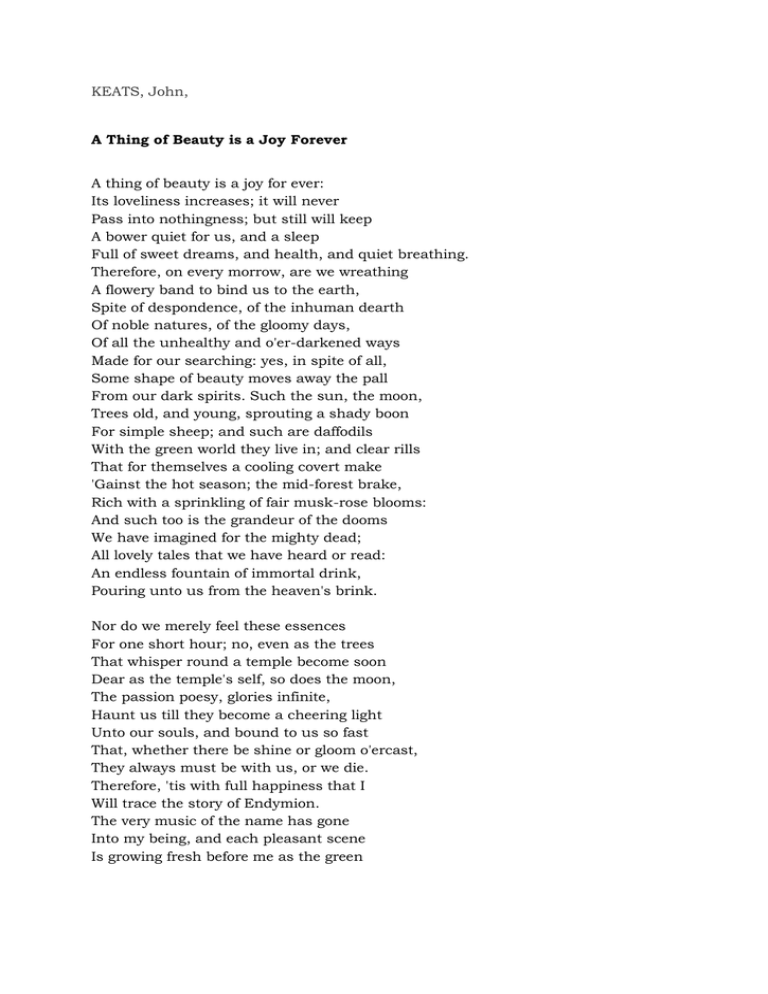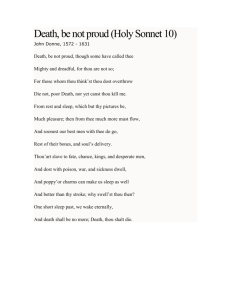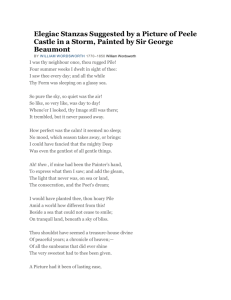KEATS, John, A Thing of Beauty is a Joy Forever A thing of beauty is
advertisement

KEATS, John, A Thing of Beauty is a Joy Forever A thing of beauty is a joy for ever: Its loveliness increases; it will never Pass into nothingness; but still will keep A bower quiet for us, and a sleep Full of sweet dreams, and health, and quiet breathing. Therefore, on every morrow, are we wreathing A flowery band to bind us to the earth, Spite of despondence, of the inhuman dearth Of noble natures, of the gloomy days, Of all the unhealthy and o'er-darkened ways Made for our searching: yes, in spite of all, Some shape of beauty moves away the pall From our dark spirits. Such the sun, the moon, Trees old, and young, sprouting a shady boon For simple sheep; and such are daffodils With the green world they live in; and clear rills That for themselves a cooling covert make 'Gainst the hot season; the mid-forest brake, Rich with a sprinkling of fair musk-rose blooms: And such too is the grandeur of the dooms We have imagined for the mighty dead; All lovely tales that we have heard or read: An endless fountain of immortal drink, Pouring unto us from the heaven's brink. Nor do we merely feel these essences For one short hour; no, even as the trees That whisper round a temple become soon Dear as the temple's self, so does the moon, The passion poesy, glories infinite, Haunt us till they become a cheering light Unto our souls, and bound to us so fast That, whether there be shine or gloom o'ercast, They always must be with us, or we die. Therefore, 'tis with full happiness that I Will trace the story of Endymion. The very music of the name has gone Into my being, and each pleasant scene Is growing fresh before me as the green Of our own valleys: so I will begin Now while I cannot hear the city's din; Now while the early budders are just new, And run in mazes of the youngest hue About old forests; while the willow trails Its delicate amber; and the dairy pails Bring home increase of milk. And, as the year Grows lush in juicy stalks, I'll smoothly steer My little boat, for many quiet hours, With streams that deepen freshly into bowers. Many and many a verse I hope to write, Before the daisies, vermeil rimmed and white, Hide in deep herbage; and ere yet the bees Hum about globes of clover and sweet peas, I must be near the middle of my story. O may no wintry season, bare and hoary, See it half finished: but let Autumn bold, With universal tinge of sober gold, Be all about me when I make an end! And now at once, adventuresome, I send My herald thought into a wilderness: There let its trumpet blow, and quickly dress My uncertain path with green, that I may speed Easily onward, thorough flowers and weed. When I have fears that I may cease to be When I have fears that I may cease to be Before my pen has glean'd my teeming brain, Before high piled books, in charact'ry, Hold like rich garners the full-ripen'd grain; When I behold, upon the night's starr'd face, Huge cloudy symbols of a high romance, And think that I may never live to trace Their shadows, with the magic hand of chance; And when I feel, fair creature of an hour! That I shall never look upon thee more, Never have relish in the faery power Of unreflecting love!—then on the shore Of the wide world I stand alone, and think Till Love and Fame to nothingness do sink. La Belle Dame Sans Merci O what can ail thee, knight-at-arms, Alone and palely loitering? The sedge has wither’d from the lake, And no birds sing. O what can ail thee, knight-at-arms! So haggard and so woe-begone? The squirrel’s granary is full, And the harvest’s done. I see a lily on thy brow With anguish moist and fever dew, And on thy cheeks a fading rose Fast withereth too. I met a lady in the meads, Full beautiful—a faery’s child, Her hair was long, her foot was light, And her eyes were wild. I made a garland for her head, And bracelets too, and fragrant zone; She look’d at me as she did love, And made sweet moan. I set her on my pacing steed, And nothing else saw all day long, For sidelong would she bend, and sing A faery’s song. She found me roots of relish sweet, And honey wild, and manna dew, And sure in language strange she said— “I love thee true.” She took me to her elfin grot, And there she wept, and sigh’d fill sore, And there I shut her wild wild eyes With kisses four. And there she lulled me asleep, And there I dream’d—Ah! woe betide! The latest dream I ever dream’d On the cold hill’s side. I saw pale kings and princes too, Pale warriors, death-pale were they all; They cried—“La Belle Dame sans Merci Hath thee in thrall!” I saw their starved lips in the gloam, With horrid warning gaped wide, And I awoke and found me here, On the cold hill’s side. And this is why I sojourn here, Alone and palely loitering, Though the sedge is wither’d from the lake, And no birds sing. Bright star! would I were steadfast as thou art BRIGHT star! would I were steadfast as thou art— Not in lone splendour hung aloft the night, And watching, with eternal lids apart, Like Nature’s patient sleepless Eremite, The moving waters at their priestlike task Of pure ablution round earth’s human shores, Or gazing on the new soft fallen mask Of snow upon the mountains and the moors— No—yet still steadfast, still unchangeable, Pillow’d upon my fair love’s ripening breast, To feel for ever its soft fall and swell, Awake for ever in a sweet unrest, Still, still to hear her tender-taken breath, And so live ever—or else swoon to death. Ode On A Grecian Urn Thou still unravish'd bride of quietness, Thou foster-child of silence and slow time, Sylvan historian, who canst thus express A flowery tale more sweetly than our rhyme: What leaf-fring'd legend haunts about thy shape Of deities or mortals, or of both, In Tempe or the dales of Arcady? What men or gods are these? What maidens loth? What mad pursuit? What struggle to escape? What pipes and timbrels? What wild ecstasy? Heard melodies are sweet, but those unheard Are sweeter; therefore, ye soft pipes, play on; Not to the sensual ear, but, more endear'd, Pipe to the spirit ditties of no tone: Fair youth, beneath the trees, thou canst not leave Thy song, nor ever can those trees be bare; Bold Lover, never, never canst thou kiss, Though winning near the goal yet, do not grieve; She cannot fade, though thou hast not thy bliss, For ever wilt thou love, and she be fair! Ah, happy, happy boughs! that cannot shed Your leaves, nor ever bid the Spring adieu; And, happy melodist, unwearied, For ever piping songs for ever new; More happy love! more happy, happy love! For ever warm and still to be enjoy'd, For ever panting, and for ever young; All breathing human passion far above, That leaves a heart high-sorrowful and cloy'd, A burning forehead, and a parching tongue. Who are these coming to the sacrifice? To what green altar, O mysterious priest, Lead'st thou that heifer lowing at the skies, And all her silken flanks with garlands drest? What little town by river or sea shore, Or mountain-built with peaceful citadel, Is emptied of this folk, this pious morn? And, little town, thy streets for evermore Will silent be; and not a soul to tell Why thou art desolate, can e'er return. O Attic shape! Fair attitude! with brede Of marble men and maidens overwrought, With forest branches and the trodden weed; Thou, silent form, dost tease us out of thought As doth eternity: Cold Pastoral! When old age shall this generation waste, Thou shalt remain, in midst of other woe Than ours, a friend to man, to whom thou say'st, "Beauty is truth, truth beauty,--that is all Ye know on earth, and all ye need to know." The Eve of St. Agnes ….. Full on this casement shone the wintry moon, And threw warm gules on Madeline's fair breast, As down she knelt for heaven's grace and boon; Rose-bloom fell on her hands, together prest, And on her silver cross soft amethyst, And on her hair a glory, like a saint: She seem'd a splendid angel, newly drest, Save wings, for heaven: — Porphyro grew faint: She knelt, so pure a thing, so free from mortal taint. ….. To Sleep O soft embalmer of the still midnight, Shutting, with careful fingers and benign, Our gloom-pleas'd eyes, embower'd from the light, Enshaded in forgetfulness divine: O soothest Sleep! if so it please thee, close In midst of this thine hymn my willing eyes, Or wait the "Amen," ere thy poppy throws Around my bed its lulling charities. Then save me, or the passed day will shine Upon my pillow, breeding many woes,— Save me from curious Conscience, that still lords Its strength for darkness, burrowing like a mole; Turn the key deftly in the oiled wards, And seal the hushed Casket of my Soul.








